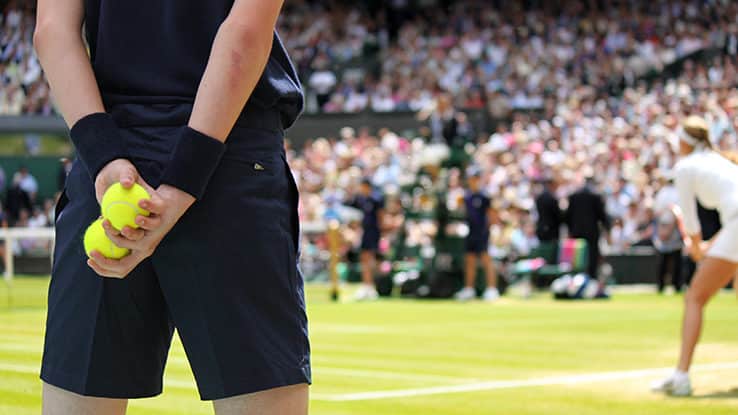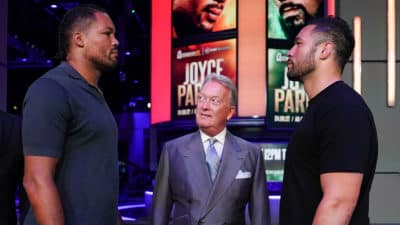Sport

Feature
10 best Wimbledon finals of the past five decades
These men’s and women’s matches are aces in tennis lore.
Usually around this time of year, everyone’s thoughts turn to tennis. Although Wimbledon has been cancelled for 2020 (which hasn’t happened since World War II), that doesn’t mean we shouldn’t celebrate it.
Many of the sport’s greatest players sealed their legacies with unforgettable wins at The All England Lawn Tennis Club, so we’ve decided to look back over the last 50 years and select the most drama-filled men’s and women’s final from each decade.
Packed with intense rivalries, powerful serves, thrilling rallies and much more, these 10 epic showdowns will remind you why we all love tennis so much!
1970s
Margaret Court v Billie Jean King (1970)
The first to be broadcast in colour, this is considered one of the most dramatic finals ever. Court needed seven match points to ultimately take the championship 14-12, 11-9 and to this day it remains the longest women’s Wimbledon final in terms of games played. A few weeks later, Court went on to complete the calendar year Grand Slam with a win in the US Open.
Arthur Ashe v Jimmy Connors (1975)
Ashe became the first black male player to win Wimbledon (and still is the only black man ever to have won) when he beat Connors 6-1, 6-1, 5-7, 6-4 in the first all-American final since 1947. Ashe was the underdog, having never beaten Connors before. He was seeded No.6 while Connors, who was the defending champion, was seeded No.1. Not only was Ashe nine years older than Connors, this was also his ninth attempt at the Wimbledon title. Connors was seen as a bit of a brat, while Ashe was considered the ultimate gentleman of the game. The win marked Ashe’s last appearance in a grand slam final.
1980s
Björn Borg v John McEnroe (1980)
One of the most famous rivalries in sport came to a head here. Borg was the No.1 seed, competing in his fifth straight final despite being only 24 years old (and having won all four of his previous attempts), whereas McEnroe was the No.2 seed appearing in his first Wimbledon final. The fourth set tiebreak is considered one of the great sporting moments of the 20th century. Lasting 22 minutes and 34 points (a record for a Wimbledon final), McEnroe saved five championship points, but Borg went on to win 1-6, 7-5, 6-3, 6-7, 8-6.
Steffi Graf v Martina Navratilova (1988)
At the age of 19, Graf was the No.1 seed going into the final against six-time defending champion Navratilova, having been beaten by her in the previous year’s final. Graf won her first of seven titles at the All England Club (5-7, 6-2, 6-1) and that year completed the calendar grand slam and also won Olympic Gold – this has been dubbed the Golden Slam and she is the only player to complete this achievement to date.
1990s
Stefan Edberg v Boris Becker (1990)
These great rivals met in three consecutive Wimbledon finals from 1988 to 1990, with each claiming one of the previous titles. Becker, the defending champion, was seeded No.2 and Edberg No.3. After losing the first two sets, Becker came back to win the third and fourth sets. Although Becker looked to be on course to retain his title, Edberg rallied and ultimately won 6–2, 6–2, 3–6, 3–6, 6–4.
Jana Novotna v Nathalie Tauziat (1998)
This was Novotna’s third appearance in the Wimbledon final, having defeated Venus Williams in the quarter final and Martina Hingis in the semi. She was famously consoled by the Duchess of Kent after losing to Steffi Graf in the 1993 final. Novotna became the oldest first-time grand slam winner in the open era at the age of 29 years and 9 months.
2000s
Venus Williams v Lindsay Davenport (2005)
The start of the Williams sisters’ decade of dominance came when Venus defeated defending champion Davenport 6-3, 7-6, having beaten her younger sister Serena (then aged 18) in the semi-final. Venus had missed the first five months of the year due to injury, but then went on to win 35 consecutive matches, including this, her first grand slam. In addition, Venus and Serena won the doubles title that year. Venus would also go on to claim a further four Wimbledon titles.
Roger Federer v Rafael Nadal (2008)
This is not only one of the most epic tennis matches of all time, but it’s also widely regarded as one of the most epic finals of any individual sport. Nadal was on the hunt for his first Wimbledon title, but to get it he’d have to defeat Federer, one the greatest players ever to hold a racket. After a 35-minute rain delay, Nadal roared into the lead, taking the first two sets 6-4, 6-4. Trying to become the first player since 1927 to come back from a two-set deficit in the Wimbledon final and win, Federer then rallied and, after another rain break, claimed the next two sets 5-7, 5-7. Constantly threatened with the suspension of play, the match ended in near darkness and eventually saw Nadal triumph over Federer in the final titanic set 9-7.
2010s
Marion Bartoli v Sabine Lisicki (2013)
Bartoli was playing in her 47th grand slam (two more than Jana Novotna had played when she won in 1998). She’d reached the final six years earlier but lost to Venus Williams. Bartoli didn’t lose a single set throughout the tournament and beat Lisicki in the final 6-1,6-4, becoming the first player, male or female, to win The Championships playing with a two-handed forehand and backhand. She announced her retirement from tennis just two months later.
Andy Murray v Novak Djokovic (2013)
It had been 77 years since the last British man won at Wimbledon (Fred Perry in 1936), when Murray defeated world No.1 and top seed Djokovic in three sets 6-4, 7-5, 6-4. Born just seven days apart, the two players were the current world Nos. 1 and 2. They had met in three previous grand slam finals, with Djokovic leading the scoreline 2-1. Murray had lost to Federer in the final the previous year, but had won the Olympic Gold a couple of weeks later. Murray would go on to win again in 2016.
Discover more:
Quiz: How well do you know your FA Cup Final trivia?
Feature: The best World Cup matches in the FIFA archives
Quiz: How well do you know your football stadiums?
Discover more about what’s going on in the world tennis and other sports in our Sports Guide.









